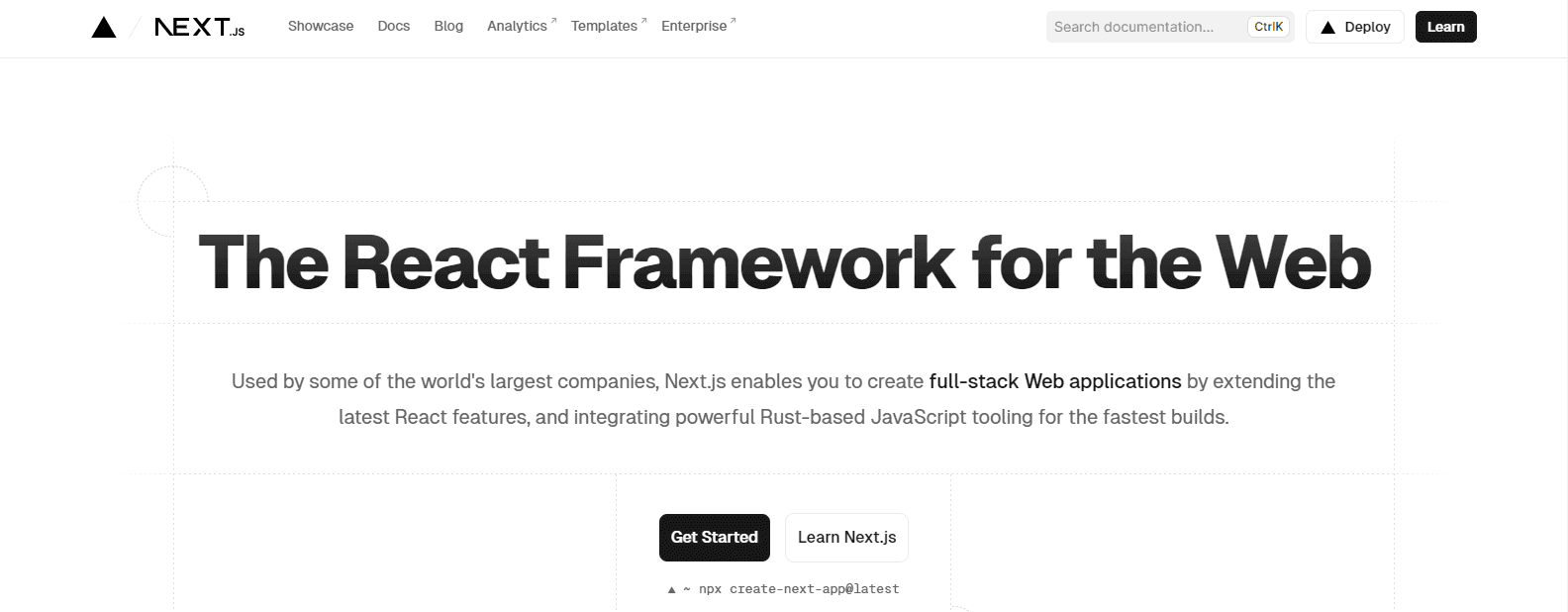What's The Best Next.js Hosting Site
- User Experience

Embarking on selecting a Next.js hosting site is akin to navigating the vast seas of web development. In this era of dynamic applications, your chosen hosting platform becomes the compass guiding your project's trajectory.
Join Kapsys as we explore your top option for Next.js hosting, compare their strengths, and guide you through choosing the best platform to suit your needs.
What is Next.js?
Next.js is a popular open-source React framework for building web applications. It is designed to make developing React-based applications more efficient by providing a structured framework and additional features.
Let's examine why choosing the right next.js hosting site is extremely important.

The Crucial Role of Next.js Hosting Sites
Choosing the right Next. js hosting site for your application is crucial for several vital reasons, each influencing your web project's overall success and performance.
Performance optimization
Next.js allows for server-side rendering and static site generation, significantly improving performance by delivering pre-rendered content.
The right Next.js hosting site can leverage these features efficiently, ensuring fast and optimized loading times for your users.
Read: Hybrid Sites With Next.js: The Best Static And Server-Rendered Worlds, Deployed On Vercel
Search engine optimization (SEO)
Server-side rendering is not only beneficial for performance but also for SEO. Search engines can easily crawl and index fully rendered HTML content, positively impacting your website's visibility and ranking in search results.
A Next.js hosting platform that supports and optimizes for SSR enhances your SEO efforts.
Read: SEO Best Practices In Next.js Applications: Search-Engine Friendly
Scalability and flexibility
As your Next.js application grows, the hosting site is critical in ensuring scalability.
The right platform should seamlessly accommodate increased traffic and demand, allowing your project to scale without compromising performance.
Additionally, flexibility in terms of server configurations and customization options is essential to meet specific project requirements.
Deployment speed and efficiency
Next.js features automatic code splitting, reducing the size of JavaScript bundles and improving loading times.
An optimal Next.js hosting site should facilitate quick and efficient deployment processes, enabling you to push updates seamlessly and minimize downtime.
Developer experience and tools
The Next.js hosting site's integrations and tools can significantly impact the developer experience.
Platforms like Vercel, designed with Next.js, provide a cohesive and developer-friendly environment, making it easier to manage deployments, monitor performance, and troubleshoot issues.
Cost considerations
Different Next.js hosting platforms have varied pricing models. Understanding the pricing structure, especially as your project scales, is crucial to avoid unexpected costs.
Some platforms offer free tiers or flexible pricing options, allowing you to choose a plan that aligns with your project's needs and budget.
Security and reliability
Next. js hosting platforms play a critical role in the security of your application. Look for secure socket layer (SSL) support, regular security updates, and robust infrastructure to protect your Next.js application and user data.
Reliability in uptime and availability is equally essential for a positive user experience.
Integration with additional services
Many Next.js applications require integration with additional services such as databases or third-party APIs.
A hosting platform that seamlessly supports these integrations can simplify the development process and enhance the overall functionality of your web application.
So, to sum it up, choosing a Next.js hosting site ultimately impacts the success and user satisfaction of your Next.js web project.
Now that we have covered all the bases let's explore the best Next.js hosting options.
Vercel
As the force behind Next.js development, Vercel emerges as a natural choice for Next.js hosting.

Recognized for its simplicity, seamless Next.js integration, and remarkable deployment speed, Vercel sets the stage for an unparalleled hosting experience.
Strengths
Here are some of the critical strengths of Versel as a Next.js hosting site:
Seamless Integration: Vercel seamlessly integrates with Next.js projects, solidifying its position as the go-to Next.js hosting site.
Global CDN: With a robust global Content Delivery Network (CDN), Vercel ensures rapid loading times for Next.js applications worldwide.
Serverless Functions: Vercel allows the effortless deployment of serverless functions alongside your Next.js app, eliminating the need for a separate server.
Considerations
Pricing Transparency: While Vercel's free tier is generous, understanding the pricing model is crucial as your project scales. Navigate the pricing intricacies to align with your project's growth.
Also read: Real-time Updates: Integrating Next.js WebSockets On Vercel
Netlify
Positioned as an all-in-one platform, Netlify goes beyond mere Next.js hosting, offering continuous deployment, serverless functions, and seamless integration with popular Git repositories.

Strengths
Here are some of the critical strengths of Netlify as a Next.js hosting site:
Continuous Deployment: Netlify Excels is constantly deployed, automating the build and deployment process whenever changes are pushed to your Git repository.
Serverless Functions: Leveraging Netlify's serverless functions enhances your Next.js app with dynamic server-side functionalities without managing a separate server.
Scalability: Netlify's scalability prowess makes it an ideal Next.js hosting site for projects of all sizes.
Considerations
Server Control Limitations: If granular server control is paramount, Netlify's platform might pose limitations. Evaluate your project's requirements to ensure compatibility.
Also read: How To Build A Next.js Blog?
Heroku
Heroku is a versatile platform supporting various programming languages, celebrated for its flexibility and user-friendly approach. Therefore, Heroku remains one of the best options for Next.js hosting.

Strengths
Here are some of the critical strengths of Heroku as a Next.js hosting site:
Extensive Add-ons: The Heroku marketplace boasts a plethora of add-ons for databases, caching, monitoring, and more, allowing personalized customization of your Next.js hosting environment.
Buildpacks: Supporting custom buildpacks, Heroku grants flexibility in configuring your deployment environment.
Automatic Scaling: Heroku's automatic scaling feature ensures your application meets demands, guaranteeing optimal performance.
Considerations
Pricing Complexity: While flexibility is a highlight, Heroku's pricing model may be intricate. Comprehend the costs associated with add-ons and scaling to avoid unforeseen expenses.
Also read: How to Build and Deploy a Modern-day Next.js Application
Layer0
Tailored for high-performance web applications, Layer0 optimizes frontend delivery, promising instant page loads and an unparalleled user experience - a crucial part of Next.js hosting.

Strengths
Here are some of the critical strengths of Layer0 as Next.js hosting site:
Edge Rendering: Layer0 introduces edge rendering, enabling your Next.js application to render on edge servers closest to your users, drastically reducing latency.
Predictive Prefetching: The platform employs predictive prefetching, loading pages before users click, resulting in almost instantaneous page transitions.
Real-Time Updates: Enjoy real-time updates without compromising performance, making Layer0 the go-to Next.js hosting site for dynamic and interactive applications.
Considerations
Specialized Use Case: Layer0's specialization lies in high-performance applications. Evaluate whether the additional features align with your project's need for speed.
Also read: How To Increase The Speed Of The Next.js App
Comparing the Next.js Hosting Site Options
The Next.js hosting solution you opt for can significantly impact crucial aspects such as deployment speed, scalability, and customization options.
As we discussed these platforms separately, let's explore and compare the offerings of prominent Next.js hosting platforms together.
We divided our comparison criteria into three factors, the most important for successful Next.js hosting.
Deployment speed
Deployment speed is crucial for Next.js hosting as it directly impacts user experience, time-to-market, and the ability to adapt to market trends swiftly.
A fast deployment process facilitates agile development, and efficient bug fixes and enhances overall customer satisfaction by minimizing downtime during updates.
Vercel: Renowned for lightning-fast deployment, Vercel takes the lead in swiftly getting your Next.js application up and running.
Netlify: Competing closely with Vercel, Netlify boasts quick and efficient deployment, ensuring your project is live quickly.
Heroku: While less rapid than Vercel or Netlify, Heroku balances deployment speed and customization options.
Layer0: Prioritizing speed, Layer0 stands out with impressive deployment times, making it the preferred choice for performance-focused applications.
Scalability
A scalable Next.js hosting solution allows your application to flexibly adapt to changing workloads, supporting the evolving needs of your users without sacrificing performance or responsiveness.
Vercel: Scales seamlessly, but users must consider potential pricing adjustments as the project expands.
Netlify: Renowned for scalability, Netlify effortlessly handles projects of varying sizes.
Heroku: Automatic scaling ensures your application can handle increased demand, making it suitable for scalable projects.
Layer0: Tailored for high-performance applications, Layer0 is the go-to choice for projects with scalability requirements.
Customization
A Next.js hosting solution with robust customization options allows for flexibility in server configurations, the integration of specialized add-ons, and the ability to meet unique needs, ultimately enhancing the development experience and maximizing the potential of Next.js applications.
Vercel: Streamlined and optimized for Next.js, perfectly balancing simplicity and customization.
Netlify: Strikes a good balance between simplicity and customization, offering an easy-to-use platform.
Heroku: Highly customizable with vast add-ons, ideal for projects with specific requirements.
Layer0: Specialized for speed but provides customization options for performance optimization.
Read: A Guide To Building a Next.js App with Kontent.ai and Deploying on Vercel
Making the Ultimate Decision
Choosing the right Next.js hosting site is a crucial decision that directly impacts the success of your project. To make the ultimate decision tailored to your needs, consider the following factors:
Understand your project's unique requirements
Identify the specific requirements and priorities of your Next.js application. Understanding your project's unique needs is the first step, whether it's focusing on speed, seamless integration, all-in-one features, or flexibility.
Evaluate platform strengths and weaknesses
Explore the strengths and weaknesses of prominent Next.js hosting platforms like Layer0, Vercel, Netlify, and Heroku. Consider factors such as deployment speed, scalability, customization options, and overall compatibility with your project.
Project-specific needs
Consider your project's specific requirements. If it prioritizes speed, Layer0 might be the ideal choice. For seamless integration with Next.js, Vercel stands out. If you need an all-in-one solution with additional features, use Netlify. For flexibility and customization, Heroku is a strong contender.
Take advantage of free tiers
Test each Next.js hosting solution to assess its suitability for your Next.js application without committing to a paid plan upfront. This allows you to experience the platforms firsthand and make an informed decision based on your project's performance and requirements.
Read: Getting Started With Next.js To Set Up A New Project

Conclusion
In the fast-paced world of web development, choosing the right Next.js hosting site is a pivotal decision. Each platform—Layer0, Vercel, Netlify, and Heroku—offers unique strengths.
To make the best choice, align your decision with your project's needs. Consider factors like deployment speed, scalability, and customization. Leverage free tiers to test each platform, ensuring a seamless fit with your application's performance goals.
Ultimately, your hosting choice shapes the success of your Next.js project. Navigate the strengths and considerations of each option to propel your application forward in the ever-evolving web development landscape.
Stay tuned with Kapsys to elevate your website capabilities!


